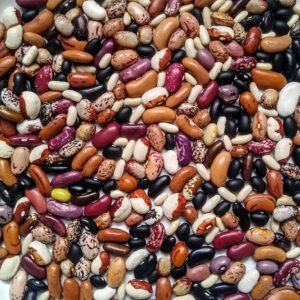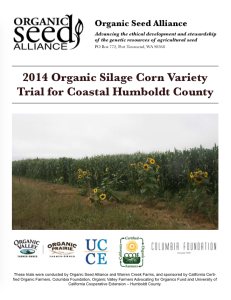
 Arcata, CA – Organic Seed Alliance (OSA) has published a report that details results from a silage corn variety trial. The trials were conducted in the North Coast of California to help the region’s farmers identify which organic and other non-GMO varieties perform best in their climate and under organic conditions. This is the only organic silage corn trial in Northern California.
Arcata, CA – Organic Seed Alliance (OSA) has published a report that details results from a silage corn variety trial. The trials were conducted in the North Coast of California to help the region’s farmers identify which organic and other non-GMO varieties perform best in their climate and under organic conditions. This is the only organic silage corn trial in Northern California.
The North Coast of California has a strong dairy industry, including organic dairies. The climate and soils of North Coast deltas, river valleys, and flood plains allow dairy farmers to graze cows on pasture for most of the year. Still, supplemental feed is required, including grain, hay, and silage corn. Silage corn is corn grown to near maturity that is then harvested as a whole plant, chopped, and fermented to increase its digestibility.
There are very few varieties of silage corn that mature early and yield well in the cool, coastal maritime climate of the North Coast. This led OSA to test 10 promising varieties in 2014 through rigorous and replicated trials, looking at yield, maturity, and silage quality. The trials were conducted at Warren Creek Farms, a certified organic farm in Arcata.
North Coast silage producers face a dearth of choice in seed appropriate for their region for two main reasons. The first is that the region is drastically different from the major corn producing areas.
“When I shared the local temperatures with a corn breeder in the Midwest, she thought there was a typo,” explains Jared Zystro, OSA’s California Research and Education Specialist, and author of the report. “There are only a few varieties in the marketplace that can mature in this region because of the cool summers.”
The second challenge, Zystro says, is that the industry leaders breeding and distributing corn focus on GMO varieties. Choice in non-GMO corn is so limited that some of the region’s farmers believe they can only access the newest and best silage corn varieties by adopting GMOs, regardless of whether they benefit from the technology. Zystro says farmers in the region have been requesting performance data on non-GMO varieties.
Furthermore, in November, Humboldt County passed Measure P, which prohibits the growing of GMOs. This measure adds a degree of urgency in ensuring that growers have access to appropriate non-GMO seed to meet the growing demand.
OSA’s trials confirmed that varieties for the North Coast must mature extremely early, and that there are currently few varieties available in that range for organic producers.
OSA will continue silage corn trials next year to provide farmers additional data on which varieties are most appropriate for organic production in the region. The data will be freely distributed to ensure broad access to the findings. Zystro emphasizes the public nature of this research, and says OSA is committed to open access.
“Farmers desperately need trial results done at the local level, and they need the results to be public,” says Zystro, who laments the increasingly privatized nature of variety trials. “How can a farmer know which variety performs best, or in which ways varieties compare, if the research and methods are not freely shared with those who rely on it most?”
The full report, 2014 Organic Silage Corn Variety Trial for Coastal Humboldt County, can be downloaded at www.seedalliance.org/publications.
This project is supported by the University of California Cooperative Extension-Humboldt, California Certified Organic Farmers, Columbia Foundation, Gaia Fund, and Organic Valley’s Farmers Advocating for Organics Fund.
MEDIA CONTACT
Jared Zystro, Organic Seed Alliance, 707-502-9984, jared@seedalliance.org
